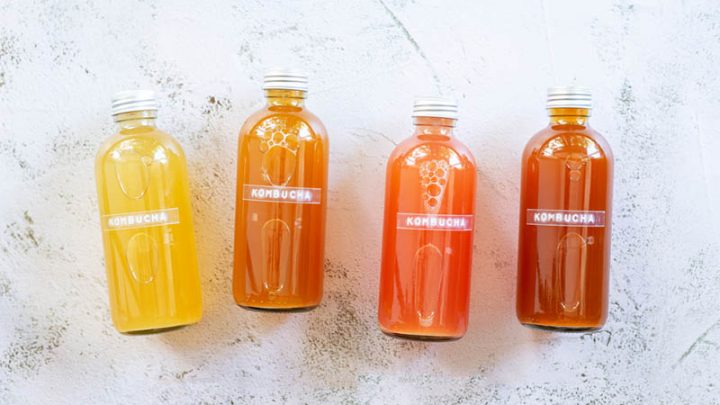Kombucha is one of the latest food crazes and has been touted as a miracle beverage due to its numerous health benefits.
But can kids drink kombucha, or are there too many risks involved?
The answer to can kids drink kombucha hasn’t been fully confirmed yet as it hasn’t been properly researched.
Although, due to the fact that its fermentation process produces trace amounts of alcohol content, it’s currently believed that drinking kombucha should be prohibited for kids.
That said, most kombucha brews barely contain any alcohol, at most 0.5%, which is about the amount you’d find in most ripened fruits and vegetables.
The real problem stems from the fact that the alcohol content depends on the company producing the beverage and the storage conditions the drink is kept in, as either of those factors can contribute to an increase in alcohol content.
This means that, according to the CDC, if the drink passes the 0.5% threshold, it should be considered as an alcoholic beverage and marketed as such, deeming it potentially unsafe for kids to consume.
There’s also the problem of it containing caffeine, which isn’t exactly the safest thing for children, pregnant women, or women who are breastfeeding their kids.
Do note that the drink is still undergoing testing and its full effects on children haven’t been fully explored yet, so its safety and overall viability should be discussed with a healthcare professional first.
But what is kombucha and how safe is it for kids to drink it? That’s what I’ll delve into in this article.
What Is Kombucha?
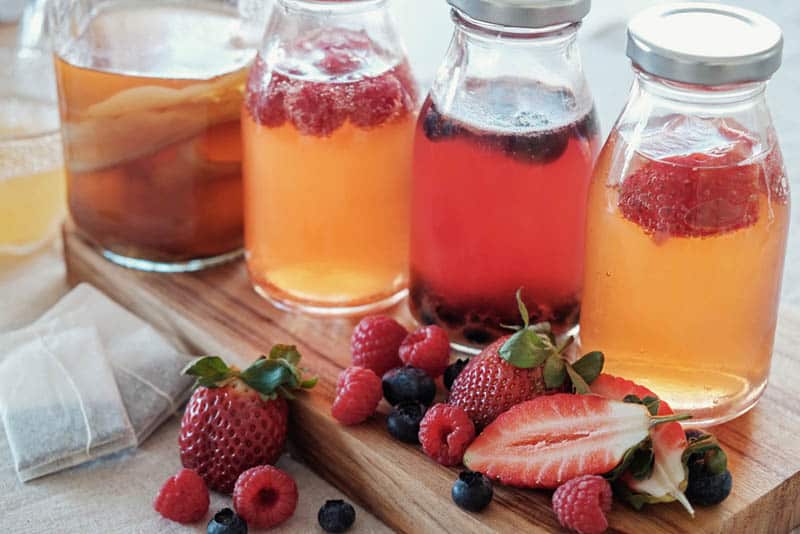
Before we get into answering can kids drink kombucha I first need to clarify what kombucha actually is for those of you who are hearing about it for the first time.
It’s a drink that dates back thousands of years, all the way back to ancient China.
It’s a sweet, somewhat sour, and fizzy concoction that’s made with fermented tea, or rather by mixing different types of oolong tea, black tea, and/or green tea together with yeast and bacteria as well as refined sugar.
All of these ingredients are mixed in and set aside to mature or ferment, allowing the yeast and bacteria to interact with the sugars and convert into probiotics, an assortment of B vitamins, as well as varying alcohol levels as byproducts of the interaction.
Even the bacteria used are quite healthy and considered a probiotic due to the fact they contain lactic acid bacteria.
This bacteria forms on the top of the drink as the fermentation process develops, as a thin layer called SCOBY (a Symbiotic Culture Of Bacteria and Yeast).
The process usually lasts about a week, give or take a few days, and is best drunk fresh when all the healthy bacteria is still abundant.
That said, it’s in an unpasteurized form so it’s still somewhat unsafe at this stage, plus, most kombucha manufacturers tend to do a second fermentation process that’s much shorter when they want to flavor the kombucha a specific way.
If you believe this might be an unsafe process, you should know it’s the same one used in producing fermented foods like sauerkraut, kimchi, and similar products.
Knowledge of kombucha tea has since been spread throughout Japan and Russia before reaching Europe and the US.
It only really took off in the early 19th century before winding down, until it was introduced again due to its apparent health benefits in 2015.
The Health Benefits Of Kombucha
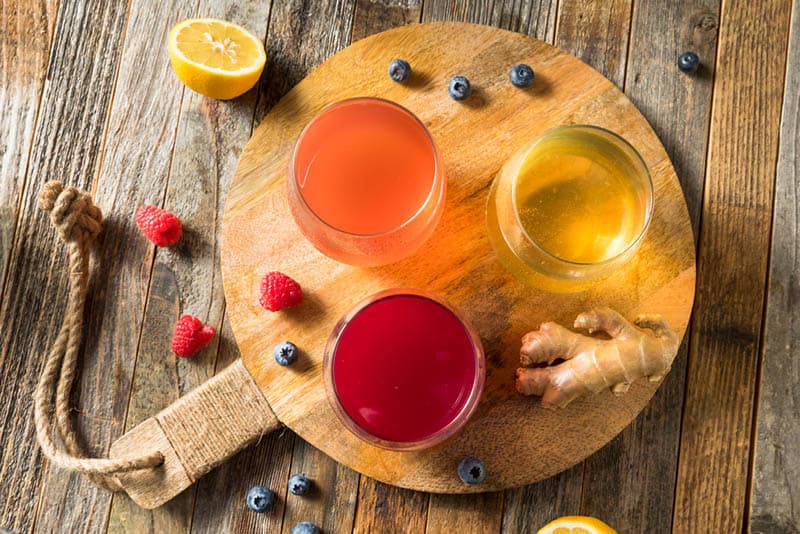
The only reason you’d want your kids drinking something special is if it’s healthy and good for them.
Well, you can certainly give them a treat here and there, but if it’s something new it needs to either taste good or be good for them, and kombucha manages to tick both boxes.
Some kids will likely protest, but there are so many different flavors and the fizzy sourness is undoubtedly going to win them over anyway.
However, it’s worth noting that kombucha is still a product that, despite having existed for thousands of years, hasn’t had its full effects thoroughly tested, and therefore should be used with extreme caution, especially with so much contradictory info out there on the topic.
However, you’re the one who needs to be impressed here, and this drink comes with quite the list of benefits.
You’ll hear many different health claims about kombucha, most of them with only a singular source to back it up, some true, some somewhat exaggerated, but we are going to discuss them all regardless.
I’ll start off with the confirmed ones, which are common with any sort of probiotic, and that’s the fact they’re known for aiding people who have IBS (Irritable Bowel Syndrome).
It’s also fantastic for helping ease the effects of diarrhea as well as helping strengthen compromised digestive systems and immune systems, so it’s a decent drink for flu season if you want some extra protection.
There are some claims that probiotics help lessen the effects of depression, but due to the nature of that disorder it can’t really be fully confirmed.
The B vitamins help stimulate brain function and improve focus, as well as regulate hormone levels and keep a healthy balance.
If green tea is used as a base, then its numerous antioxidants also translate into the drink itself, which helps prevent cells from wearing out.
Other benefits that translate from kombucha made by fermenting green tea are the ability to lower cholesterol and help regulate your blood sugar levels, making you less likely to suffer from heart disease or a heart attack.
However, these benefits have mostly been seen in animals and haven’t been fully confirmed for humans, especially as our bodies tend to react very differently from person to person.
While all of these benefits seem good, the full extent of the effects of kombucha have still not been confirmed, nor is it a magical cure-all or some sort of elixir of immortality.
So, if you’re wondering whether or not can kids drink kombucha, they most certainly can, but whether or not they should is a different matter entirely, especially considering the potential risks and side effects.
Remember, research on the topic hasn’t even come close to being finalized yet, so it might turn out that there aren’t many benefits to it.
For all we know it could be just a placebo effect.
Risks And Side Effects Of Kombucha
Kombucha can be considered a healthier alternative to soft drinks given the numerous flavor profiles available, and the much lower sugar content. However, it still has its downsides.
Everyone loves to bandwagon on the latest wellness trends, which swap one health food for another every week and treat it as ambrosia, but few realize there can be too much of a good thing.
The risks
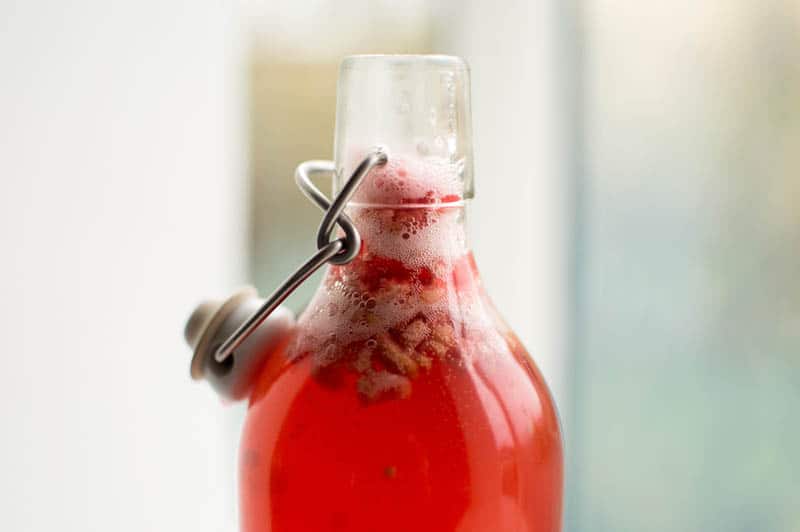
The main risks involved with kombucha come mostly from the fermentation process.
While most manufacturers will always do proper quality control with their product, you should still be wary of anything you purchase in the grocery store or order online.
Chances are they might not have been stored properly, which might cause the fermenting process to continue, in which case the percentage amount of alcohol, or the ABV, within the kombucha will continue growing, turning the concoction into an alcoholic beverage.
On the other hand, improper storage could have caused it to spoil, nullifying the health benefits of the drink and potentially causing harmful microorganisms to thrive in such a bacteria-rich environment, or worse, for mold to start growing.
That’s why you should always be wary of anything that smells funky.
It’s better to throw it away than risk suffering problems that might require you to see a doctor or even go to the hospital.
The risk increases further for people who are into home brewing as homemade kombucha is a lot harder to regulate.
You’re likely missing a good amount of the equipment required to properly make kombucha, and your tools might not be up to code as there’s nobody to inspect them besides yourself.
Various steps of the process can go wrong in this case, like using the wrong type of bacteria, which leads to the harmful ones developing in the brew, mold development, or the continued work of the enzymes on breaking the sugar down.
This will ultimately lead to the percent alcohol rising, very likely above the suggested limits, and with you having no real way to check, you might end up giving it to your child, which is definitely not recommended.
The side effects
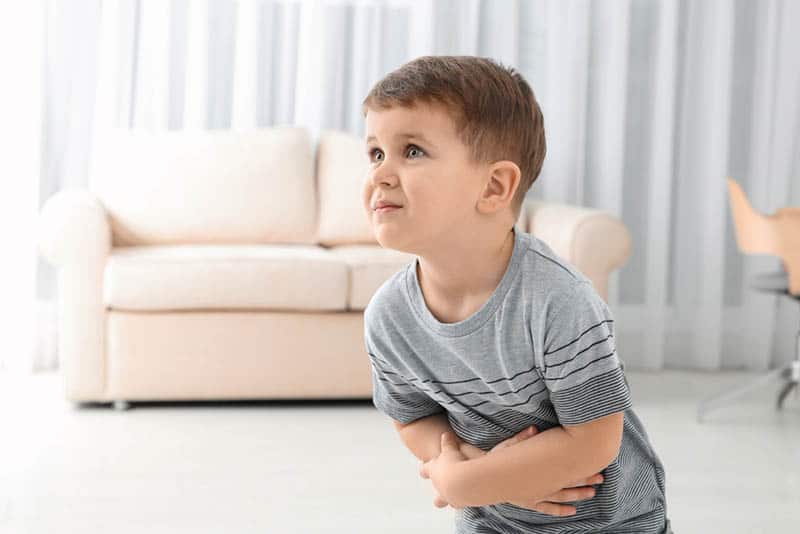
All of these missteps in brewing can lead to some side effects.
They range from mild annoyances to potentially life-threatening issues.
Some of the currently known potential problems include:
• Nausea
• Vomiting
• Diarrhea
• Other digestive issues
• Different types of fungal infections (e.g. candidiasis)
• Lactic acidosis
• Jaundice
• Other liver problems
• Potential allergies
While the digestive issues are most likely to arise if you drink too much of it, as it is a bacteria-rich beverage, they are going to be more of a temporary nuisance than anything, the others, depending on their severity, could end up potentially being fatal.
This is especially true for people with compromised immune systems because the drink is a double-edged sword in their case.
It might help strengthen it, or it might make matters worse by causing severe bacterial and fungal infections if they are drinking a bad batch.
The other potential problem is alcohol intoxication from the risks mentioned earlier.
When your non-alcoholic drink turns out to be otherwise, and you give it to your kids whose bodies are a lot smaller than that of a fully grown adult, it’ll hit fast.
Because of their size, it only takes a little for them to suffer the effects of alcohol, which is not something you want to expose a little child to.
This is why it’s not really a question of can kids drink kombucha as they most certainly can, it’s just that you need to be careful about both proper dosage and the quality of the booch itself.
Once again, remember that the research on the subject of kombucha is incomplete and a lot of the information present on the internet is often contradictory.
I advise talking to your doctor or dietitian about the topic for more concrete information.
Safety Recommendations For Homebrew Kombucha
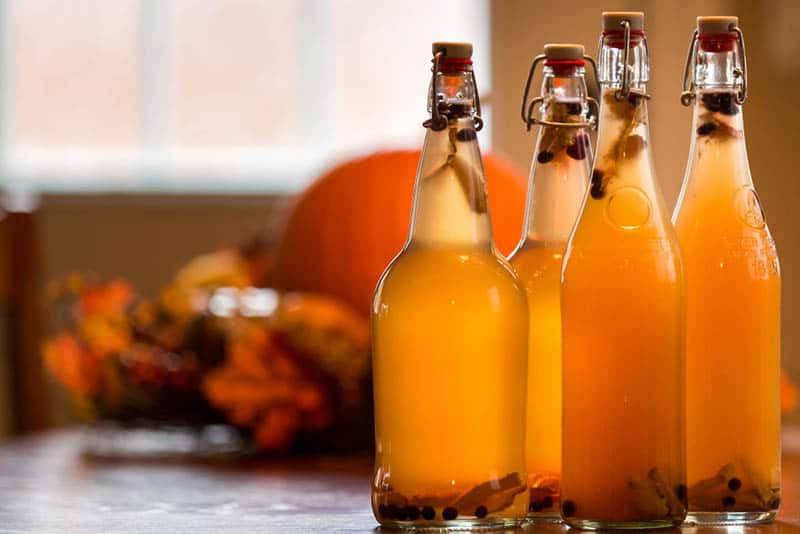
The same methods of safety should be applied to homebrewed kombucha as store-bought or factory-made ones, which are to use sterile surfaces like stainless steel, plastic, or glass if possible.
That way the container material won’t interact with the brew itself, therefore preventing any potential tainting or cross-contamination.
You should also make sure to thoroughly clean the containers after every batch and make sure they’re fully dried before being used again to prevent any mold from growing on the inside, or remnants of the old batch tainting the new one.
And, as with everything else, you should always make sure to keep your hands clean when making the stuff.
So, Can Kids Drink Kombucha Then?
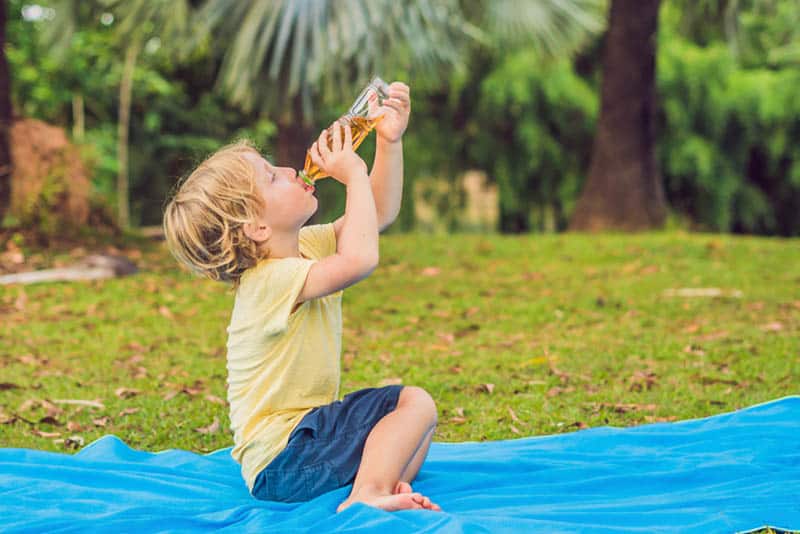
They most certainly can.
The likelihood of the alcohol levels becoming too dangerous for a child to consume are extremely low, as the upper limit allowed is equivalent to that found in fruit juice and overly ripe fruits.
Besides, if the percent alcohol is higher than intended, you’re likely to notice it by simply taking a few whiffs as the drink is going to smell funky, which is when you know it’s either been brewed or stored improperly and should be thrown away immediately.
Other than that, it’s about learning the proper dosage and keeping to the other safety recommendations I mentioned earlier.
Know that there’s currently no recommended dosage as of yet, and most of it is trial and error.
Many people suggest going with what you feel is right for you, but you should be the judge of that when it comes to your children.
After all, research on the topic hasn’t been finalized yet, and everything found on the internet should be taken with a pinch of salt.
Be careful when giving it to your kids and consult your doctor about it first.
The current CDC suggestion is to only go for about 4 ounces a day, with the option of going all the way up to 8 ounces if no adverse effects show, but it’s not worth risking it.
Alcohol isn’t the issue, but rather the caffeine within it due to the teas used in the process of making it.
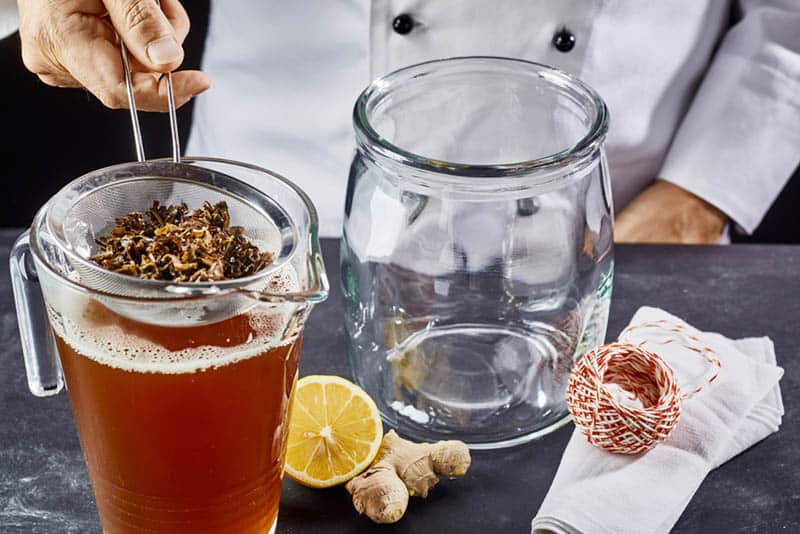
This is why it’s not safe for children, pregnant women, or women who are still breastfeeding to consume too much of the stuff as it might lead to some complications.
Kids might end up becoming a bit more hyperactive with a shorter attention span, or even restless with an inability to sleep at night temporarily, while pregnant women risk endangering their child from overconsumption of caffeine.
The same goes for people with compromised immune systems.
Start off with low amounts to avoid endangering yourself too much while also reaping its numerous health benefits, and work your way up slowly if need be.
Other than that, be extra careful when buying it or going homebrew and you should be just fine.
However, one final thing to note that’s worth remembering for every natural or alternative form of medicine is to always consult your doctor or your personal dietitian on the matter.
They’re the ones with the knowledge and the experience that can determine whether or not you or your kids should consume anything of the sort, and if so, how much is a safe dose.
In Conclusion
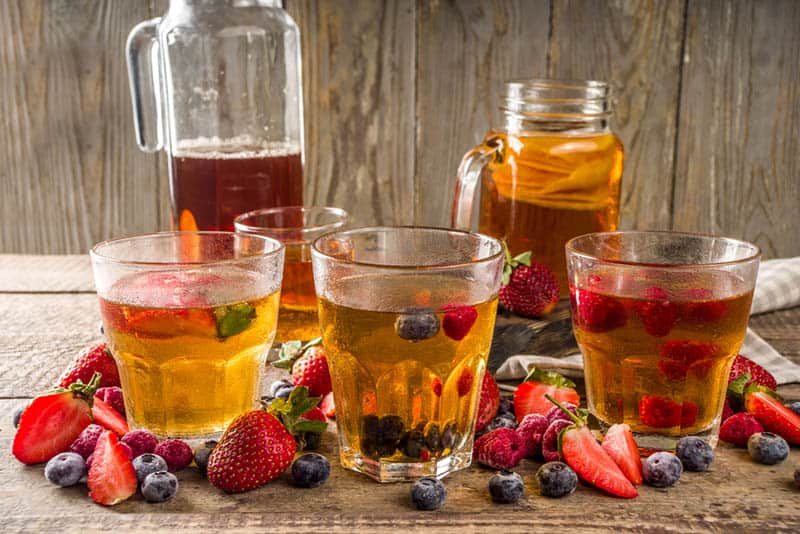
While answering can kids drink kombucha? it has been determined that it is safe to do so, as long as you determine the proper dosage and that it’s of good quality.
However, this comes from information gathered from the internet and should therefore not be taken over the word of a proper health care professional.
Make sure to talk to your doctor and/or dietitian before giving it to your kids.
Proper storage and your sense of smell are key.
Any kombucha that smells bad should be disposed of immediately and the batch should be avoided altogether as it was likely contaminated in some way.
If you’re buying it from the grocery store or online, make sure to swap brands if it keeps on happening.
If you’re making homebrew, however, make sure to inspect all your brewing supplies and always use containers that won’t interact with the contents, like stainless steel, plastic, or glass, and be sure to follow the given instructions to the letter.
Other than that, always make sure to ask your doctor whether or not can kids drink kombucha or if it’s safe for you to consume, as it’s a form of alternative medicine, and listen to their advice.
Finally, remember that while it might be a healthy alternative to a good number of things, treat it as a supplement rather than a miracle cure because it most certainly can’t replace modern medicine.
References:
• Centers for Disease Control and Prevention (December 08, 1995) “Unexplained Severe Illness Possibly Associated with Consumption of Kombucha Tea.” CDC website.
Like this post? Please share or pin it for later. You can also stay in the loop and follow us on Facebook, Instagram or Pinterest.
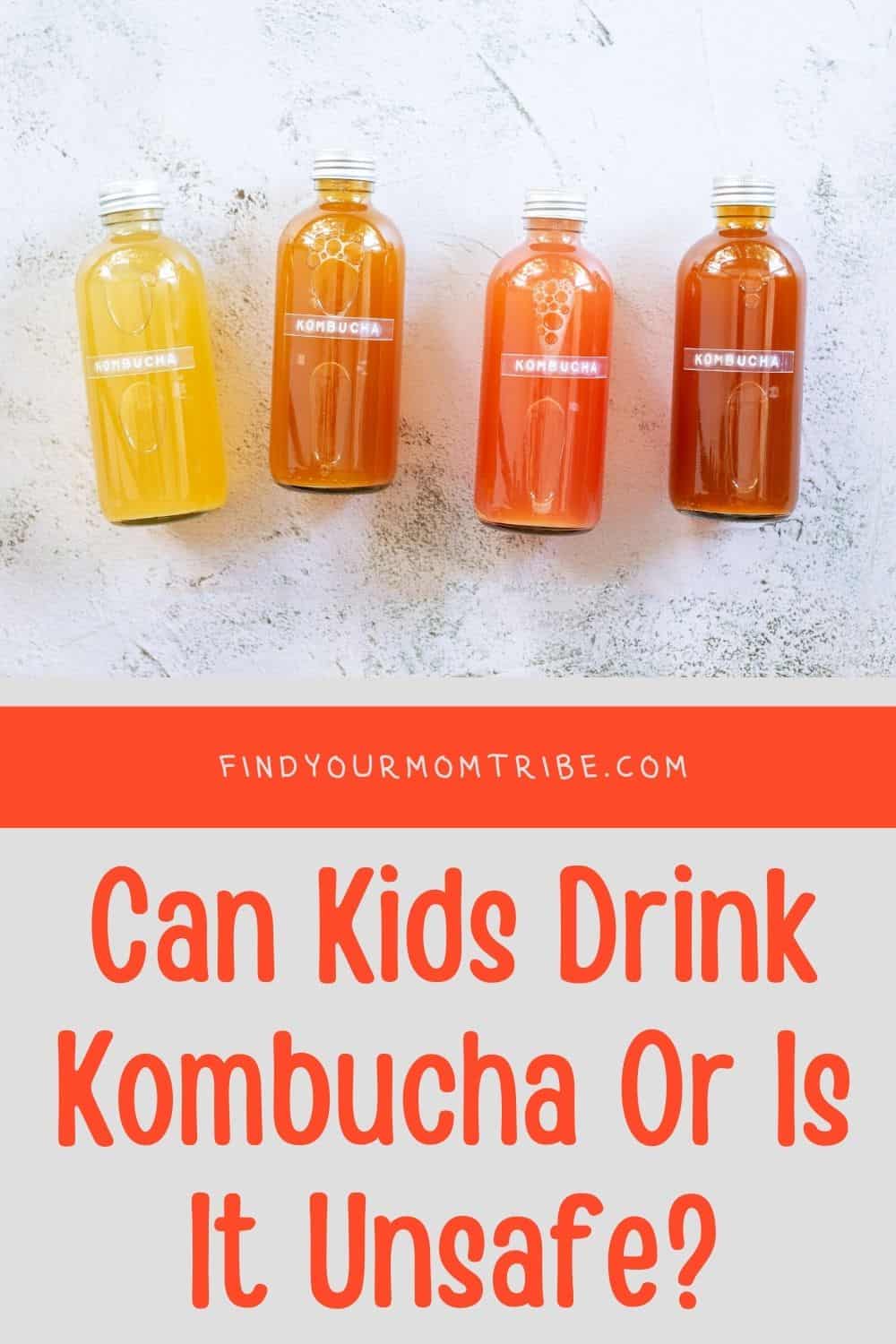
We love honesty! Find Your Mom Tribe is an Amazon Associate and we earn from qualifying purchases through affiliate links at no extra cost to you. Please see our full Amazon Affiliate disclosure for more information.

